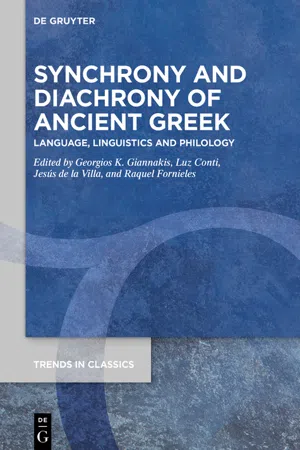
Synchrony and Diachrony of Ancient Greek
Language, Linguistics and Philology
- 528 pages
- English
- PDF
- Available on iOS & Android
Synchrony and Diachrony of Ancient Greek
Language, Linguistics and Philology
About this book
This collective volume contains thirty six original studies on various aspects of Ancient Greek language, linguistics and philology written by an international group of leading authorities in the field.
The essays are organized in five thematic groups covering a wide variety of issues of ancient Greek linguistics, ranging from epigraphy and the study of individual dialects to various other aspects of the structure of the language, such as phonetics and phonology, morphology, lexicon and word formation, etymology, metrics as well as many syntactic matters and problems of pragmatics and stylistics of the language; a number of essays move in the middle ground where language, linguistics and philology crosscut and cross-fertilize each other with the application of linguistic theory to the study of classical texts.
The work is of special relevance to scholars interested in Greek linguistics in general and in particular aspects of the Greek language.
Frequently asked questions
- Essential is ideal for learners and professionals who enjoy exploring a wide range of subjects. Access the Essential Library with 800,000+ trusted titles and best-sellers across business, personal growth, and the humanities. Includes unlimited reading time and Standard Read Aloud voice.
- Complete: Perfect for advanced learners and researchers needing full, unrestricted access. Unlock 1.4M+ books across hundreds of subjects, including academic and specialized titles. The Complete Plan also includes advanced features like Premium Read Aloud and Research Assistant.
Please note we cannot support devices running on iOS 13 and Android 7 or earlier. Learn more about using the app.
Information
Table of contents
- Preface
- Contents
- List of Figures and Diagrams
- List of Tables
- Emilio Crespo Güemes: The Man and the Scholar
- Publications of Prof. Emilio Crespo
- Part I: Epigraphy and Dialectology
- The Ionic of Lampsacus and the Month of Badromion
- Reflexes of Koineization in Ancient Epirote Feminine Names
- Women’s Names in the Lesbian Dialect
- “Nicomachos Made Me!” Palaeography and Self-promotion in Late Archaic Greek Italy
- Αn Arcadian Man Called Βôθις, or Rather Βόθις?
- Verba Volant. Notes on Some Graffiti from Thasos
- Modern Greek Evidence for Ancient Greek Dialects: The Case of Megarian
- Part II: Lexicon, Onomastics, Morphology, and Morphophonology
- The Noun for ‘Horse’ in Mycenaean and Some Related Terms
- Greek δάρδα, ‘Bee’
- On Some Naming Constructions in Homeric Greek
- On the “Kriaras” Lexicon of Medieval Vulgar Greek: Issues of Substance (MGL)
- Getting There? Greek δύναμαι, ‘Be Able’
- The Κένταυρος Controversy Revisited: An Old Etymological Puzzle in a Comparative-Mythological Perspective
- μνημονεύω
- Sappho’s Little Cuddly Fawns: A Reply to an Alternative Proposal (Including a Few Remarks on the Semantics of the Adjectives in -ιος and -ειος)
- Main Phonetic Changes in Ancient Greek Obscuring the PIE Ablaut
- Part III: Syntax and Clause Structure
- Reconstructing (Late) Proto-Indo-European Syntax: Absolute Constructions
- Γίγνομαι as the Lexical Passive of the Support Verb ποιέω in Ancient Greek
- On the Use of the Oblique Optative Dependent on Verba Dicendi in Herodotus
- On Negation, Jespersen’s Cycle, and Negative Concord in Post-Classical Greek
- A Construction Grammar Approach to Ancient Greek Argument Structure Constructions
- Past Tenses of Modal Verbs: ἔδει and (ἐ)χρῆν in Attic Tragedy and Comedy
- Relative Time and Narrative in Herodotus and Thucydides
- Part IV: Pragmatics and Discourse
- The Grammaticalization of μέντοι. Genesis and Scope Increase
- Off- and On-record Complaints in Sophocles: An Initial Approach
- A Note on the Anastrophe of περί with the Genitive in Classical Greek
- Impersonalization as a Mechanism of Impoliteness in Aeschines and Demosthenes: A Study of οὐδείς and μηδείς
- Discourse Markers, Interpretation, and Translation in the Lord’s Prayer
- Evolution of πλήν
- Discourse Markers ἔμπᾱς/ἔμπᾱν/ἔμπᾰ Compared with ἔμπης in the Archaic and Classical Periods
- Part V: In the Linguistics-Philology Interstices
- “Love Teaches”: Echoes of a Fragment from Euripides
- Elis in Homer: Language, Archaeology, Epic Tradition
- The Concept of ‘Emphasis’ in Ancient Greek and Indo-European
- A Quantitative Tetrameter for Proto-Indo- European
- Penis ex Machina as ‘Anticlimax’: ἐξέβαλ’, οἰῶ, τὸ ξίφος (Ar. Lys. 155–156)
- Pythagoras and the Magi
- List of Contributors
- Index